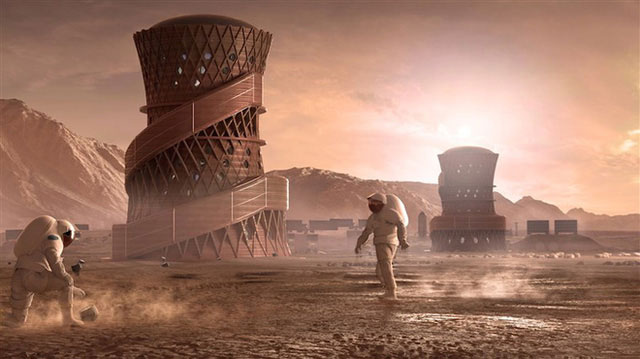Why do humans need to breed with 'immortal creatures' if they want to live on Mars?
According to biological experts, cells that are hybridized with the DNA of the organism called "immortal monsters" are much more resistant to cosmic radiation than the average person. often.
To be able to send people to Mars in 2030 according to NASA's plan, the astronauts on the mission will face health risks.
During a mission to explore the Red Planet for at least 900 days, astronauts will come out of the protective shield of the Earth's magnetic field, exposed to radiation from cosmic rays born in stellar or supernova explosions. . At the same time, they will also suffer from osteoporosis syndrome, which causes astronauts' bones to weaken after long periods of living in a zero-gravity environment.
Despite the aforementioned risks, astronauts can still return to Earth "completely," as confirmed by NASA.

If humans want to survive on Mars, humans will probably have to edit DNA.
However, for those assigned to settle on Mars, this is a completely different story. If humanity wants to stay healthy for a long time on Mars or any other planet other than Earth, we may need to turn ourselves into mutants. This is a confirmation from experts in biology at the seminar on the challenges that humankind may face in the process of settling in space, which was recently held in New York.
Accordingly, genetic engineering and other advanced gene-editing technologies "may be used if humans want to live, work and develop on Mars," said Kennda Lynch, an expert in biology. and geology at the Houston Research Institute (USA).
Not fiction
Basically, modifying genes to create "super powers" doesn't just exist in fiction movies or fiction. In fact, scientists have been doing this in real life. For example, the DNA of Tardigrades (water beetle) has been tested by scientists into human cells in a laboratory.
Unlike other creatures on Earth, the Tardigrades, which appeared 500 million years ago, was not subject to evolution. It is also considered an immortal being, when no harsh living conditions can kill it. In addition to living anywhere on Earth, Tardigrades has been shown to live in a vacuum, or even places with the harshest radiation like the Moon.

Water bears (Tardigrades) were dubbed the "immortal monsters".
" Water- borne beetles and extreme bacteria (aerobic organic organisms that live in extremely harsh conditions - NV) such as the radioactive bacteria Deinococcus radiodurans possess incredible biological properties. We can take advantage of these characteristics of one of them, "said expert Christopher Mason, associate professor of genetics at Weill Cornell University (New York, USA).
Remarkably, tardigrades' DNA hybridization with human cells has yielded amazing results. As revealed by expert Christopher Mason, the modified cells are much more resistant to cosmic radiation than normal human cells.
Open up new opportunities for humanity
The "temporary borrowing" of these biological properties not only allows humans to settle on Mars. It even opens us the opportunity to explore worlds with more extreme climates in the Solar System.
For example, settling on the surface of Jupiter's Europa satellite poses lots of difficulties and risks. A very serious problem is the intense radiation intensity emitted from the Jupiter radiation belt, 10 times stronger than the Earth's Van Allen radiation belt. People cannot live on or near the surface of Europa without special radiation protection clothing. Another problem is the extremely cold temperatures on the Europa surface (about -170 degrees celsius).

With huge oceans beneath the thick layer of snow and ice, Europa satellites are considered to be the most suitable places for humans to live in the future.
" If we get there, will occur the case body astronauts were" cooked "entirely by the amount of radiation emitted from Jupiter is so big ," the expert Mason said. "" They will gripping death, unless we take some protection, including providing as much radiation shield as possible . "
Meanwhile, the application of genetic engineering will make the trip to Europa, which is considered to be the most suitable place for humans to live in the future, becomes more feasible.
Notably, the application of genetic engineering and gene editing will certainly not be limited to astronauts and those who will settle on Mars. Recent advances in the field of synthetic biology will open a new chapter, as "modified, specially designed" bacteria will help humans build settlements on the Red Planet, according to the researchers. expert Kennda Lynch.
Specifically, the researchers considered the use of DNA-modified bacteria to improve Mars, making the habitat less harsh and more suitable for humans.
- Here's how humans live on Mars: Growing vegetables in a cellar and ... chewing on live insects
- Strange species of almost 'immortal' creatures
- 'That' on Mars will be dangerous, but it can create new subspecies of humans
- 5 delicious bizarre creatures on Mars
- Miraculous nature: These are creatures that make you believe in immortality!
- 5 ways to warm Mars without a nuclear bomb
- Humans can live immortally in computers
- Humans can only survive 68 days on Mars
- Details of how humans will live in Mars, expected in 20 years
- Humans can live in pits on Mars
- Selected 100 people to Mars, live and do not return
- Aliens are hiding underground?
 Announced 3 houses on the Moon and Mars
Announced 3 houses on the Moon and Mars Science proves: Mars also knows 'deflated'
Science proves: Mars also knows 'deflated' Elon Musk announced the price for a Mars trip was 11.6 billion VND, free of charge
Elon Musk announced the price for a Mars trip was 11.6 billion VND, free of charge NASA discovered strange 'gate' on Mars, is the hiding place found?
NASA discovered strange 'gate' on Mars, is the hiding place found?